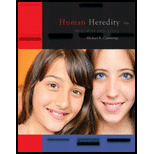
Would ISCI be an option? Why or why not?
Jan, a 32-year-old woman, and her husband, Darryl, have been married for 7 years. They have attempted to have a baby on several occasions. Five years ago, they had a first-trimester miscarriage, followed by an ectopic pregnancy later the same year. Jan continued to see her OB/GYN physician for infertility problems but was very dissatisfied with the response. After four miscarriages, she went to see a fertility specialist, who diagnosed her with severe endometriosis and polycystic ovarian disease (detected by hormone studies). The infertility physician explained that these two conditions were hampering her ability to become pregnant and thus making her infertile. She referred Jan to a genetic counselor.
At the appointment, the counselor explained to Jan that one form of endometriosis (MIM 131200) can be a genetic disorder, and that polycystic ovarian disease can also be a genetic disorder (MIM 184700) and is one of the most common reproductive disorders among women. The counselor recommended that a detailed family history of both Jan and Darryl would help establish whether Jan’s problems have a genetic component and whether any of her potential daughters would be at risk for one or both of these disorders. In the meantime, Jan is taking hormones, and she and Darryl are considering alternative modes of reproduction.
Using the information in Figure 16.4, explain the reproductive options that are open to Jan and Darryl.
To determine: Whether intra cytoplasmic sperm injection (ISCI) is an option for given the couples.
Introduction: Ms. J (32 years old woman) and Mr. D have been married for 7 years. Their attempts to have a baby have failed every time as Ms. J has experienced 4 miscarriages. The fertility specialist diagnosed Ms. J with severe endometriosis and polycystic ovarian disease and explained that these two conditions were making Ms. J infertile. The genetic counselor explained that both these conditions were genetic. Therefore, detailed family history needs to be observed to determine the potential risk of any of her daughter to have the disease.
Explanation of Solution
Intra cytoplasmic sperm injection (ISCI) is used to treat the male infertility problems of low sperm count or motility. In this procedure, an egg is injected with a carefully selected single sperm from the male partner. The embryo develops in an incubator and it is then transferred to the uterus of the female partner.
With reference to given case study, ISCI would not be an option for Ms. J and Mr. D because Mr. D does not have the infertility problem. Ms. J is infertile because of her endometriosis and polycystic ovarian disease. Because of these two conditions, Ms. J cannot carry a child to the full term. They may choose surrogacy as an option.
Hence, it can be concluded that ISCI cannot be an option in this case because there is no infertility problem related to male.
Want to see more full solutions like this?
Chapter 16 Solutions
Human Heredity: Principles and Issues (MindTap Course List)
- How is a protein destined for the Endoplasmic Reticulum (ER), imported into the ER? Be concise.arrow_forwardFind out about the organisations and the movements aimed at the conservation of our natural resources. Eg Chipko movement and Greenpeace. Make a project report on such an organisation.arrow_forwardWhat are biofertilizers and mention the significancearrow_forward
- PCBs and River Otters: Otters in Washington State’s Green-Duwamish River have high levels of polychlorinated biphenyls (PCBs) in their livers. PCBs can bind to the estrogen receptors in animals and disrupt the endocrine system of these otters. The PCBs seem to increase the estrogen to androgen ratio, skewing the ratio toward too much estrogen. How would increased estrogen affect the river otter population? Based on your reading of the materials in this unit, what factors can affect fertility in humans? Explain how each of the factors affecting human fertility that you described can disrupt the human endocrine system to affect reproduction.arrow_forwardOther than oil and alcohol, are there other liquids you could compare to water (that are liquid at room temperature)? How is water unique compared to these other liquids? What follow-up experiment would you like to do, and how would you relate it to your life?arrow_forwardSelection of Traits What adaptations do scavengers have for locating and feeding on prey? What adaptations do predators have for capturing and consuming prey?arrow_forward
- Competition Between Species What natural processes limit populations from growing too large? What are some resources organisms can compete over in their natural habitat?arrow_forwardSpecies Interactions Explain how predators, prey and scavengers interact. Explain whether predators and scavengers are necessary or beneficial for an ecosystem.arrow_forwardmagine that you are conducting research on fruit type and seed dispersal. You submitted a paper to a peer-reviewed journal that addresses the factors that impact fruit type and seed dispersal mechanisms in plants of Central America. The editor of the journal communicates that your paper may be published if you make ‘minor revisions’ to the document. Describe two characteristics that you would expect in seeds that are dispersed by the wind. Contrast this with what you would expect for seeds that are gathered, buried or eaten by animals, and explain why they are different. (Editor’s note: Providing this information in your discussion will help readers to consider the significance of the research).arrow_forward
 Human Heredity: Principles and Issues (MindTap Co...BiologyISBN:9781305251052Author:Michael CummingsPublisher:Cengage Learning
Human Heredity: Principles and Issues (MindTap Co...BiologyISBN:9781305251052Author:Michael CummingsPublisher:Cengage Learning Principles Of Radiographic Imaging: An Art And A ...Health & NutritionISBN:9781337711067Author:Richard R. Carlton, Arlene M. Adler, Vesna BalacPublisher:Cengage Learning
Principles Of Radiographic Imaging: An Art And A ...Health & NutritionISBN:9781337711067Author:Richard R. Carlton, Arlene M. Adler, Vesna BalacPublisher:Cengage Learning- Case Studies In Health Information ManagementBiologyISBN:9781337676908Author:SCHNERINGPublisher:Cengage
 Nutrition Through The Life CycleHealth & NutritionISBN:9781337919333Author:Brown, Judith E.Publisher:Cengage Learning,
Nutrition Through The Life CycleHealth & NutritionISBN:9781337919333Author:Brown, Judith E.Publisher:Cengage Learning,





